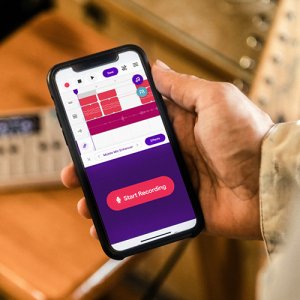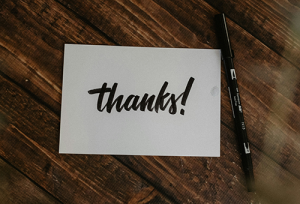10 The Interview
As noted above, one of the critical elements of a profile essay is a firsthand experience with the subject you’re writing about. For you, this will be an interview and time spent observing the person. Because you’ll be working so closely with another person, it’s worth spending a little extra effort to think about how to make your time with them go as smoothly as possible.
 It’s entirely possible that this is the first time that you’ve conducted a formal interview with another person, so we’re going to review some helpful tips and important protocols. Even if you’re a seasoned interview professional, it’s worth making sure your ducks are truly and completely in a row.
It’s entirely possible that this is the first time that you’ve conducted a formal interview with another person, so we’re going to review some helpful tips and important protocols. Even if you’re a seasoned interview professional, it’s worth making sure your ducks are truly and completely in a row.
Before the interview
- Schedule it – Don’t just show up and expect to interview them whenever you want. Allow them to set aside time that they can dedicate entirely to you. Try to encourage them not to have other things going on so that they aren’t likely to be distracted.
- Explain everything – Make sure that they understand why you are doing this and how their words will be used. Give them a sense of how long the interview will last. Also explain who is likely to end up reading your paper. Definitely mention that you’ll be recording the interview.
- Learn everything you can about your subject – Do your homework. Check out their social media or anything else that has been shared online about them. Use the information that you find there to help you prepare for what you want to talk about when you have them in front of you. If the information exists online, do not ask them for it during the interview. That would just be a waste of both your time and theirs. If you discover that they were born in rural Kansas, don’t ask them where they are from. You could, of course, use that information and ask them what growing up in rural Kansas was like and how it affected their childhood, if you want.
- Write down your questions – Don’t expect to show up and just have a good conversation. Plan out your questions so that you can get the information you need from them within the time you have planned out. There’s a decent chance that, once the conversation gets going, you will forget all the great questions you planned out beforehand if you haven’t written them down.
- Prep your equipment – One of the requirements of the interview is that you record it. This recording will not be turned in, but it is an important step as part of any research interview that you do.[1] You will use the recording to create a word-for-word transcript of your interview. If you don’t record it, you won’t be able to make the transcript or use any quotes in your profile essay.
 So, how are you going to record the interview? Most smartphones have built-in sound recording apps—Voice Memos on iOS and Sound Recorder[2] on Android. Have you ever used it? Do you know how to start a recording or stop it? Do you need to save it, or does it save automatically? Do you have enough battery power to record an hour-long interview? Do you have enough storage space on your phone for the audio file? This is a really crucial step that you really don’t want to mess up on the day of the interview. Practice, study, and practice some more so that you can make your phone or recorder do all the right stuff at the right time.
So, how are you going to record the interview? Most smartphones have built-in sound recording apps—Voice Memos on iOS and Sound Recorder[2] on Android. Have you ever used it? Do you know how to start a recording or stop it? Do you need to save it, or does it save automatically? Do you have enough battery power to record an hour-long interview? Do you have enough storage space on your phone for the audio file? This is a really crucial step that you really don’t want to mess up on the day of the interview. Practice, study, and practice some more so that you can make your phone or recorder do all the right stuff at the right time.
During the interview
- Ask permission to record the interview – In most states,[3] the law says that as long as you are part of the conversation, you don’t need to ask permission to record it.[4] However, in 11 states,[5] the law says that all participants in a conversation must give permission to record, so it’s always best to ask. Besides, if you drop your phone on the table between you and hit record without asking, it can feel a little threatening, as if you’re about to interrogate them about a crime instead of just chatting about their stamp collection or whatever. So, simply be polite and ask first. Make sure they know that you need the recording so that you can quote them accurately in your paper.
- Start with small talk – Again, we don’t want this to feel like you’re grilling your profile subject. Ask how they’re doing, what they did this past weekend, what they think about the weather, or whatever comes to mind. Ease into the interview by getting them comfortable talking about easy, insignificant things first. Then, start with easier questions before moving to the harder, more thoughtful ones.
- Don’t interrupt a story – If they start to go off topic, don’t cut them off. It’s possible that they’ll mention something that catches your interest and turns out to be more interesting than what you had planned. You can always redirect them back to your questions after. This isn’t cable news—there’s no need to interrupt or talk over them or be antagonistic.
- Ask about follow-up questions – At the end of the interview, ask them if you could contact them later with follow-up questions. There’s a decent chance that you forgot to ask something or didn’t have time. There’s also every possibility that, when you listen to the recording, you realize that there’s information you didn’t get from them and need, or that you don’t understand what they said and need some clarification. Keep the lines of communication open so you can get more help later if needed. Follow-up questions can certainly be answered over email or the phone, but remember to record them again if you talk to them so that you can accurately use their answers in your writing.
- Thank them – Make your mothers proud. Say thanks and mean it.
After the interview
- Write notes as soon as possible – Even though you recorded the interview, the recording probably just caught the sounds. It’s impossible to get the full sense of the person’s behavior from the audio alone. Did they make nervous gestures? Did they seem confident or worried? Were they sweating or easygoing? Were they distracted or laser focused? Write down your impressions as soon as you can after the interview so that you don’t forget how it felt to be with them and talk to them.
 Send a thank-you note or email – This is not old-fashioned, and it can go a long way towards making sure that they are willing to answer more questions in the future if something else comes up.
Send a thank-you note or email – This is not old-fashioned, and it can go a long way towards making sure that they are willing to answer more questions in the future if something else comes up.- Transcribe the interview – Transcribing means writing down exactly what was said during the interview. It’s a word-for-word writing of the conversation.
 That means you’ll need to listen to your recording while typing what you hear. You’ll have to listen, pause, type, play, listen, pause, type, rewind, check what you wrote as you listen, pause, type more…and so on. It is tedious. It is no fun. It can take 3 to 4 hours to type out a one-hour interview, so make sure you give yourself enough time to get this done before the transcript is due. This is a critical part of any kind of qualitative research[6] that you might do in the future, so you might as well get used to it.
That means you’ll need to listen to your recording while typing what you hear. You’ll have to listen, pause, type, play, listen, pause, type, rewind, check what you wrote as you listen, pause, type more…and so on. It is tedious. It is no fun. It can take 3 to 4 hours to type out a one-hour interview, so make sure you give yourself enough time to get this done before the transcript is due. This is a critical part of any kind of qualitative research[6] that you might do in the future, so you might as well get used to it. - Mark your transcript – After you type up the interview, read it. Make marks or highlight or indicate answers that you might like to use in your writing. Find the really good bits so that you don’t have to hunt for them later when you’re writing.
- Offer to let your subject read your paper – It’s a show of good faith to let the other person know what you said about them before you submit it. That way, if they feel you’ve misrepresented them in any way, they can ask you to remove or edit anything that feels off to them.
- And that’s really what this is: research for your paper. ↵
- I think? Confirmation from an Android-owning person would be awesome. ↵
- Including Utah and Arizona. ↵
- Which means that it is illegal to record a conversation you’re not a part of unless you get permission first. ↵
- Including California and Nevada. ↵
- Where you gather data that are not just numbers. ↵

